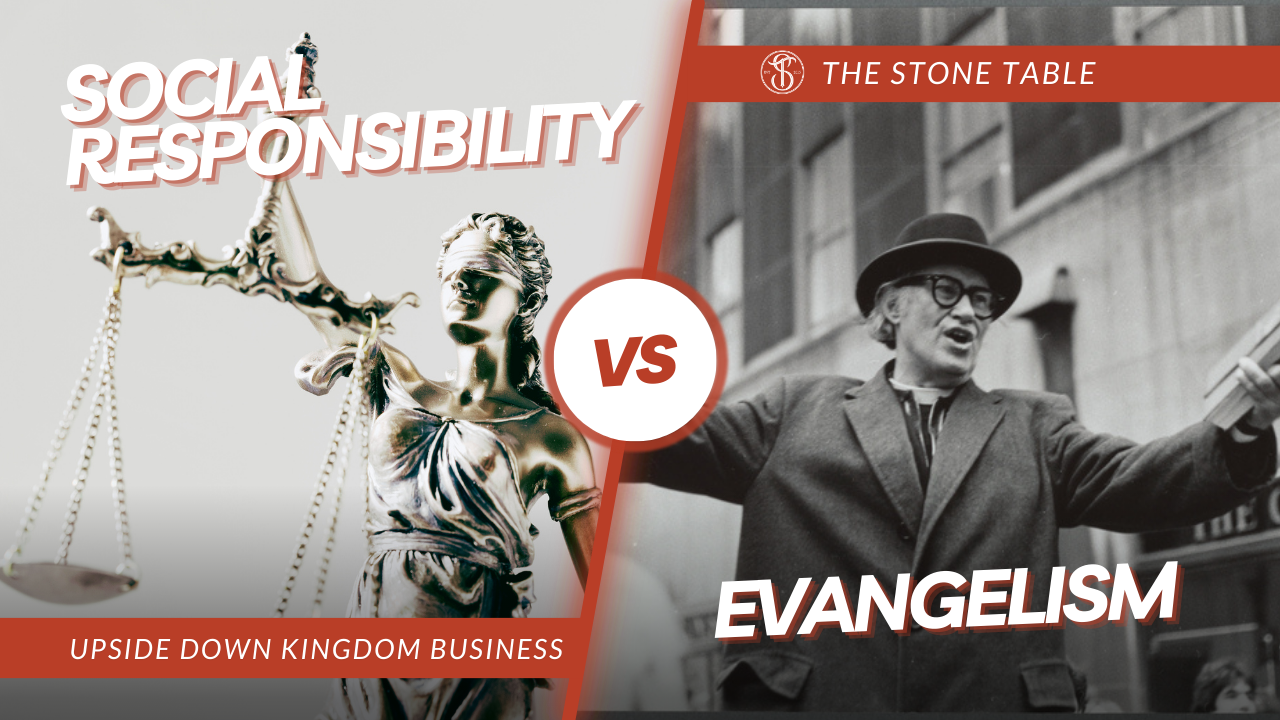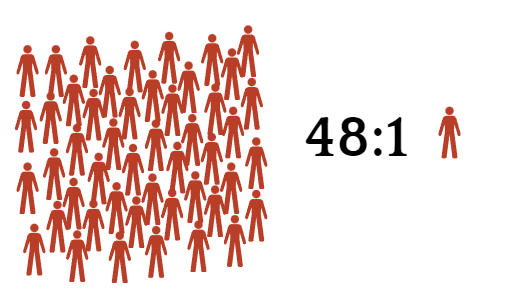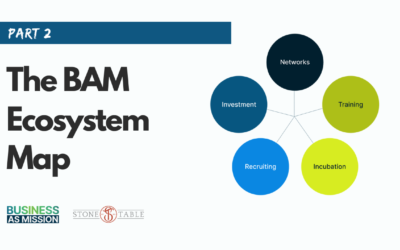Upside-Down Kingdom Business: Evangelism Vs Social Responsibility

If you’re looking for a 480% return on your investment, try blessing people.
Yeah?
Yes, really. I’m serious.
Blessers vs. Converters
In 2008, Mark Russell conducted a fascinating study on the efficacy of Business as Mission (BAM) teams in Thailand. He observed two distinct groups: the “blessers” and the “converters.”
The blessers believed their primary purpose was to be a blessing to those around them. They saw gospel conversations as a natural outflow of their good works. The converters, on the other hand, defined their purpose as evangelism first. They focused on having as many spiritual conversations as possible.
What was the result?
The blessers had an immensely greater social impact. By constantly blessing their communities, they earned trust and goodwill, paving the way for meaningful relationships.
The converters, however, struggled to make a positive impact and often found their intentions perceived negatively rather than as acts of love.
But here’s the real kicker: the blessers outperformed the converters in leading others to Christ by a staggering ratio of 48 to 1. Putting blessing before evangelism proved far more effective than focusing solely on conversion.

Called to Bless
The implications of this are huge.
Scripture says, “And I will make of you a great nation, and I will bless you and make your name great, so that you will be a blessing.” (Genesis 12:2)
God is a missionary God! He chose to reveal Himself to the world by entering into a marriage covenant with Israel and lavishing blessing on them as they lived out His ways. He called them to stand out from the surrounding nations. How would they stand out? Well, one way was that they would be unusually crazy about blessing everyone around them.
Now, for those who are feeling that they are not blessed, let me remind you that the Spirit of the Living God is in you. You are blessed!
In the Old Testament, God dwelled among the Israelites in the temple. He chose to meet them there in that central place.
In the New Testament, Jesus makes a way for the Holy Spirit to literally dwell in all believers. God decentralizes His temple and chooses to pour out the power of His Spirit on all people (1 Cor. 3:16, Acts 2:39, Romans 8:11). He makes a way for each of us to be a blessing, not only in the ways that we were always called to do (Job 29:12-17), but also in miraculous ways (1 Cor. 4:20).
Moreover, if you have the privilege of accessing this message through technology, you are undoubtedly blessed by global standards. An annual household income of more than $2,920 places you among the wealthier half of the world’s population.
You are called to bless! I am called to bless!
Evangelism and Social Responsibility
Now, blessing takes on many forms, and one of those forms is what we call “social responsibility.” (Isaiah 1:17, Deut. 24:17-22, Micah 6:8, etc).
If you’re not sure what to think about social responsibility, let me encourage you – you’re not the first to feel that way. A Lausanne occasional paper from 1982 convened to address this very issue. There was a growing divide in the body over evangelism versus social responsibility, and in short, the committee affirmed the biblical basis for both.
Furthermore, however, they went on to say that evangelism and social responsibility are most often intertwined and contingent upon one another. You could say that evangelism needs social responsibility, and social responsibility needs evangelism.
To put it another way, we cannot have faith without works or works without faith. We must have both. The bible gives us two clear examples for each. (James 2:17-18 describes faith without works, and Matthew 7:21-23 describes works without faith.)
Jesus also weaves these two together. He began His ministry by reading Isaiah 61:
“The Spirit of the Lord is on me, because he has anointed me to proclaim good news to the poor. He has sent me to proclaim freedom for the prisoners and recovery of sight for the blind, to set the oppressed free, to proclaim the year of the Lord’s favor.” (Luke 4:18-19)
He came to proclaim the good news of the gospel, and as He taught, He also did the work of social responsibility. Jesus regularly blessed people by feeding or healing them before the people believed and followed him. And the disciples followed in His footsteps, often doing miraculous works that blessed the people and got them asking questions before they proclaimed the gospel.
So we see that social responsibility is a bridge or partner to the work of evangelism. Additionally, however, the Lausanne committee also pointed out that social responsibility is a clear outflow of the gospel. It is not only a vehicle for the gospel, but once someone believes, it is their “good works” that exemplify their faith (Gal. 5:6, James 2:18, 1 John 3:16-18, Tit. 2:14, Eph. 2:10).
Doing Justice
Another word for social responsibility is “social justice.” Timothy Keller, in his book “Generous Justice,” writes, “On paper we may ask, ‘Should Christians do evangelism or social justice?’ But in reality, these two go hand-in-hand.”

In “Generous Justice,” Keller responds to a growing cynicism in the church regarding the work of social justice. He notes that many seem to think that paying market rates is always good and that free enterprise will always bring benefits to the needy in the long-run. But, as discussed in a previous article in this series, there are certainly many cases where we are called to be “equitable” rather than “equal” in our apportionment. God has not only asked us to have equal weights (Leviticus 19:35-36). Jesus taught the disciples to take things a step further:
“And if anyone wants to sue you and take your shirt, hand over your coat as well.” (Matthew 5:40)
This is summed up well in the following except from “Generous Justice:”
“There is a prevailing argument in faith and work conversations that we should be ethical and we will gain long-term success in our businesses. But the bible says the righteous disadvantage themselves to advantage others.”
Kingdom business blesses others, even when it may be to our own detriment. God’s upside down kingdom does not guarantee that free markets will save people. He asks us to go beyond that and step into the midst of injustice.
Business is necessarily relational. It is social. And good business is built on the principles of justice. Yes, our church buildings are great places to feed the poor and care for widows, but let me encourage you that business is a natural place for the work of justice.
You are the hands and feet of Jesus in the marketplace, and your business has the opportunity to do justice. To love. To Bless.
Word and Deed
Of course we are aware of the temptation to assume that our faith and works do not need the accompaniment of words at all.
This is probably a good time to remind you, dear reader, that Francis of Assisi never said those famous words, “preach the gospel, and if necessary, use words.”

There are many today who would prefer to simply “do good” in the world without giving tribute to the One who is alone good.
Yet we know that we must live out the gospel in word and in deed (Colossians 3:17). And,
“How then will they call on him in whom they have not believed? And how are they to believe in him of whom they have never heard? And how are they to hear without someone preaching?” (Romans 10:14)
Love & Go
Well. That’s it! The jury is out.
Thousands of years and billions of dollars of research and development expenditures have yielded this one truth: Human beings were designed to love God and love others. When we get that right, everything else falls into place.
Jesus gave us two commandments. Love God (Matthew 22:36-38). Love people (Matthew 22:39). And then He left us with a final commission, “Go and make disciples of all nations…” (Matthew 28:19).

I know this sounds simple, but it’s not. I work with missional businesses all the time, and I can tell you that kingdom business is hard.
We want results. We want those bottom line metrics moving in the right direction. And it’s tempting to skip steps.
Too often I watch missionaries and Christian business people push for the work of telling before they have done the work of loving or push for the work of loving before they have done the work of abiding in Christ.
Our first call is to love God.
“The chief end of man is to glorify God and enjoy Him forever.” (Westminster Catechism)
If we ever attempt to minister without getting this right first, people will get hurt and our love will look like agenda.
Secondly, and let me reiterate, this is second, not first, we are called to love our neighbor as ourselves. This is simply an extension of Genesis 1:28 and 12:2. We were entrusted to care for all of creation and bless (Isaiah 1:17, Micah 6:8, Job 31:38-40 and others).
Jesus and the apostles often met physical needs before they did the work of “telling.”
When we get those first two things in order, rooting everything that we do in love, then we can joyfully go about the work of going and telling (Colossians 3:17, Romans 10:14, 1 Peter 3:15).
Summary
So what is kingdom business?
Well, as we learned in the previous article, kingdom business serves.
Hopefully you can take away from this that kingdom business also blesses. It does justice, and not only justice, but as Timothy Keller puts it, kingdom business does “generous justice.”
Kingdom business is first and foremost rooted in the practice of loving God and honoring Him, and when we begin by loving Him, we can then see a love of others flow through the work of our hands. We will begin to bless.
- Kingdom business serves
- Kingdom business blesses
- Stay tuned for the next article…


